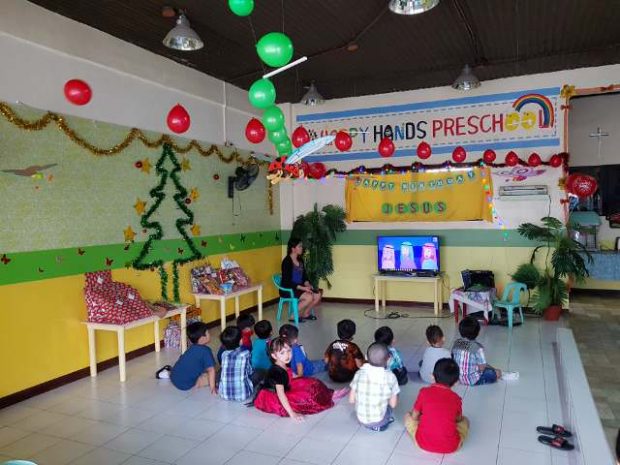[아시아 취학전 교육⑤필리핀] 관련법 ‘완벽’ 불구 예산·인력 ‘태부족’
필리핀에서는 0~4세의 아동이 약 1500만명에 달한다. 전체 인구의 10.7%를 차지하는 수치다. 이는 곧 미취학 아동들에 의해 필리핀 교육시스템이 큰 변동을 겪을 것임을 예고하는 것과 다름없다.
취학전 아동의 교육은 굉장히 중요하다. 이 시기에 아이들은 신체적·정신적·정서적으로 가장 많은 성장과 발달을 이룬다. 두뇌 발달은 0-4세 사이에 가장 빠른 것으로 밝혀졌다. 또한 아이들은 이 시기에 기본적인 자아정체성을 형성하고 세계관과 도덕관을 세우게 된다. 이에 따라서 부모와 교사 그리고 돌봄교사의 역할은 매우 중요하다.
필리핀 정부는 이같은 상황을 정확히 인식해 유치원에 대한 지원을 위해 관련 법률을 입안·통과시켰다. 필리핀은 1991년 ‘모두를 위한 교육’(Education For All, EFA) 정책을 바탕으로 유아교육 정책을 펴고 있다. 이는 유네스코의 ‘모두를 위한 교육’(EFA)의 일환으로 실행돼 2015년을 완료연도로 시작했다. 2000년엔 ‘Republic Act(RA) 8980’이 통과됐다. 이는 중앙정부뿐 아니라 지방정부가 유아교육에 적극 지원토록 하는 게 초점이 맞춰졌다. 이 법안은 ‘아이들의 첫번째 교육자는 부모’란 점을 명시적으로 밝혔다.
2011년 ‘RA 10157’이 국법으로 제정됐다. 필리핀에선 이 법안을 ‘유치원교육법’이라고 부르고 있다. 이 법에 따르면 유치원은 기본적인 교육을 시작하는 의무교육 단계로 명문화됐다. 이 법의 핵심은 “모든 아이들에게 유치원 교육을 받을 수 있는 공정한 기회를 제공하는 것”이다. 이 법안은 아동이 유치원 교육을 의무적으로 받게 함으로써 초등학교 입학 후 학교생활에 잘 적응토록 하는 게 입법 취지였다.
이어 2013년에는 ‘Early Years Act’라고 불리는 ‘RA 10410’ 법안이 통과됐다. 이 법은 “0세 아이들에 대한 교육이 매우 중요하다”고 명문화했다. 이 법안 통과 후 의회는 아이들의 교육, 영양, 가치관 형성을 위해 다양한 프로그램을 설계·실행하는 여러 방안을 제안했다.
필리핀 역시 유치원은 정부기관이나 개인이 운영한다. 중앙 또는 지방정부가 운영하는 유치원은 무료다. 유치원은 공교육의 일환으로 매년 정부가 예산을 지원한다. 교재와 학습도구, 원복은 모두 무료다. 일부 재정상태가 좋은 대도시나 지방정부의 경우 무료 급식을 실시하기도 한다. 재정이 열악한 지자체나 도서벽지에선 급식은커녕 아예 유치원이 없는 곳도 있다.
사립유치원의 경우 원비가 비싸 부잣집 아이들이 입학할 수 있다. 학습 교구와 커리큘럼은 최신형이며, 교사 1인당 맡는 원생 숫자가 매우 적다. 사립유치원은 정부 지원에 의존하지 않으며, 학부모가 내는 수업료로 운영한다. 이에 따라 아이들과 학부모 요구에 더 민감하게 반응하지 않을 수 없다. 심지어 일부 유치원은 필리핀 거주 외국인 자녀들이 다니는 국제학교에 입학할 수 있도록 별도의 특정서비스를 제공하기도 한다.
필리핀 정부는 지금까지 유치원 교육에 대해 막대한 예산 지원을 했다. 교육정책과 관련 법 역시 잘 돼 있는 편이다. 하지만 인구의 폭발적인 증가에 비해 경제, 인프라, 인력자원은 턱없이 부족한 편이다. 유치원 교육부문에는 여전히 개선할 점이 많다는 반증이다. (번역 조일연 인턴기자)
Alin Ferrer-Garganera
There are about 11.5 million Filipino children aged 0-4 years. This represents 10.7% of the total Philippine population. This means there is both a great challenge and opportunity for the Philippine educational system, as this age range represents the pre-school stage.
This pre-school stage is very important, as various studies have pointed out, that this period in a child offers the greatest growth and development, including physical, mental and emotional. Brain development has been proven to be fastest in this 0-4 year age. It is also widely accepted that the child forms the basic foundations of his identity, world perspective and moral beliefs. It is therefore important that all parents, teachers and caregivers are given the right guidance on how to teach and form the minds and behaviors of pre-school children.
Philippine government has accepted this big responsibility and has passed several laws to ensure that pre-school is given adequate attention and government support. As early as 1991, the country already crafted an ”Education For All” (EFA) plan which is based on the Early Childhood Care and Development (ECCD) framework. The plan was in response to UNESCO’s international call for EFA which is to be achieved by 2015. By 2000, Republic Act (RA) 8980 was passed and ECCD was made a national law, which emphasized the role of local governments in supporting a National System for ECCD. This law affirmed the role of parents as the child’s “primary caregiver and first teachers”.
In 2011, RA 10157 was enacted as national law and this was called “The Kindergarten Education Law”. This made kindergarten compulsory and mandatory entry stage to basic education. The spirit of the law was to give “equal opportunities for all children to avail of accessible kindergarten education”. This law made kindergarten a requirement before a child can enter Grade 1 of the formal education system, so that children are more ready to experience big school learning.
In 2013, the Philippines passed RA 10410 or the “Early Years Act”, this time establishing that age 0-8 as the “first crucial stage of educational development.” This law established and strengthened the “early childhood care and development” (ECCD) Council to design and implement community-based and family-level programs for children, including education, nutrition, values formation.
Kindergarten is provided by government and private sector. Government-run kindergarten are free, and is almost available in all major cities, big towns and provincial capitals. These kindergarten are part of the public school system which is annually supported by the government with budgets. Also, most books, learning materials and uniforms are free. If the city or local government has enough funds, they are also able to provide food and nutrition services. However, this is not true for all the Philippines. In fact, some of the poorer areas or far-away islands are not able to provide kindergarten services at all.
Then there is the private school kindergarten. These are more expensive, and only the rich families are able to send their children here. The learning materials and curriculum here are state-of-the-art, with a very low student-teacher ratio. These private-run schools do not depend on government support, but rely on the payment of their clients. They offer better services and equipment, and are more responsive to the needs of the children. Some kindergarten even offer specialized services for foreigners based in the Philippines, to prepare their children for international school institutions.
The Philippine government has given high attention for the needs of children to benefit from kindergarten. There are enough policies and laws. However, the financial, infrastructure and human resources are not enough to respond to the huge needs of the growing population of Filipinos. There are still a lot of areas to improve the delivery of kindergarten education in the Philippines.







